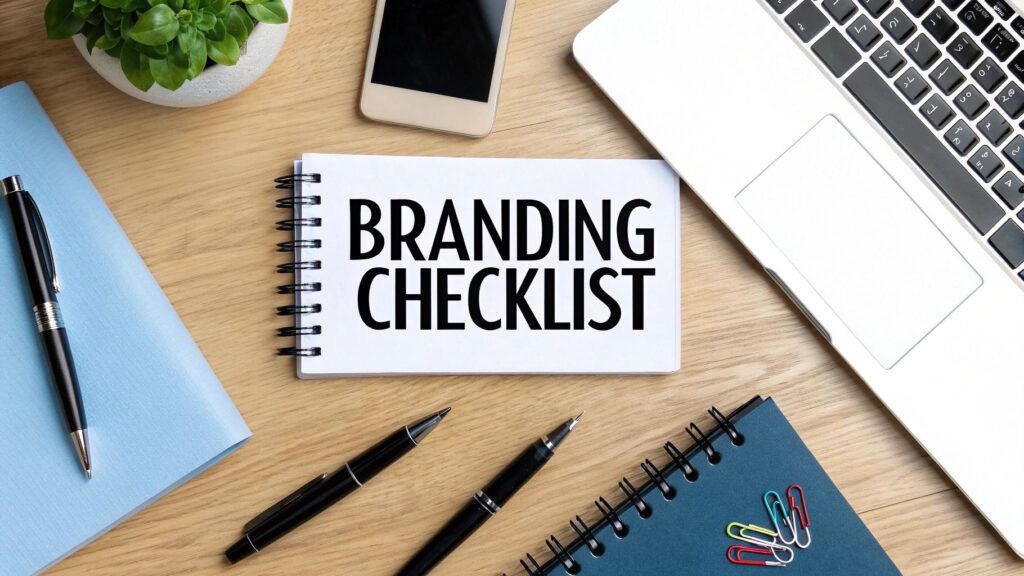
Why Strategic Personal Branding Matters Now

A strong personal brand has become essential for standing out professionally. Just like products need distinctive packaging to catch attention on store shelves, your personal brand helps you stand apart from others in your field. This is particularly important for entrepreneurs, marketers, and independent professionals looking to grow their careers and businesses. But what makes a personal brand truly strategic?
Defining Strategic Personal Branding
Strategic personal branding goes beyond basic self-promotion – it's about thoughtfully presenting yourself to your target audience. You need to identify your key strengths, understand who you want to reach, and craft messaging that connects with them. For instance, if you specialize in social media marketing, your personal brand should highlight this expertise to attract clients needing those specific services. This focused approach helps you stand out among other marketing professionals.
Think of your personal brand as a compass that guides your professional decisions and communications. It shapes your content creation and ensures you stay consistent across different platforms. While 70% of professionals believe personal branding matters for business growth, the Jago Personal Brand Health Check report found that only 15% have a defined strategy. This gap shows many miss out on the full benefits of strategic branding.
The Benefits of a Strategic Approach
Following a strategic personal branding framework helps you build recognition within your specialty area. When you communicate clearly and consistently, you create deeper connections with your target audience. This leads to more meaningful engagement and interactions. The end result? More opportunities come your way – from new client work to speaking engagements to partnership possibilities. While developing your personal brand takes time, a strategic method ensures your efforts pay off through tangible results.
Building Trust Through Authentic Leadership

A strong personal brand starts with being genuine. When you show up as your real self, you build trust and create meaningful connections with your audience. Your personal brand must reflect who you truly are – your core values, beliefs, and what drives you. Like a house needs a solid foundation, your personal brand needs authenticity at its core to stand the test of time.
Share Knowledge, Not Self-Promotion
Many people fall into the trap of constant self-promotion when building their brand. True leadership means focusing on helping others grow. Rather than highlighting past achievements, share practical insights that solve real problems for your audience. For instance, if marketing is your expertise, provide specific tips and strategies others can implement, instead of just talking about your successes.
Tell Your Story
Stories connect with people on an emotional level. By openly sharing both your wins and failures, you make your brand more human and relatable. When you show vulnerability, it helps people trust you and see beyond the polished exterior to the real person underneath. Including authentic stories should be a key part of developing your personal brand. Want to learn more? Check out this guide to people branding.
Build Real Relationships
True engagement means forming actual connections, not just gathering followers. Take time to respond thoughtfully to comments, join discussions, and show sincere interest in your audience. Research shows that business leaders' personal brands significantly impact trust – 77% of consumers are more likely to buy when CEOs are active on social media, and 60% consider a CEO's personal brand more important than the company brand. Learn more about personal branding strategies. When you lead with authenticity and build a clear personal brand, you create lasting loyalty and trust that drives long-term success.
Crafting Your Distinctive Brand Identity
Creating a personal brand goes beyond just having a polished online presence. It's about developing a memorable identity that connects with your target audience. Like perfecting a signature recipe, you need to combine the right elements in a way that makes you stand out.
Uncovering Your Unique Value Proposition
Your unique value proposition (UVP) sets you apart from others in your field. Ask yourself: "What makes me the best choice?" This could be your specialized skills, particular viewpoint, or mix of experience and interests. For instance, a marketing consultant might focus specifically on growing email lists for online stores, making them different from general marketers. A clear UVP helps draw in the right opportunities.
Defining Your Core Message Architecture
After identifying your UVP, you need a clear way to share it consistently. This is your core message architecture – think of it as your communication roadmap. It includes your quick pitch, professional bio, and main topics you discuss in your content. When your message stays consistent across all platforms, people quickly grasp what you offer and how you can help them.
Developing a Visual Identity That Stands Out
The visual parts of your brand matter for recognition. Create a consistent look across your online presence with your profile photo, colors, fonts, and image style. A creative entrepreneur might use bright, modern visuals, while a business consultant could choose classic, professional designs. These visual elements quickly show your brand's personality.
Maintaining Consistency and Evolving Your Brand
While consistency builds recognition, your brand shouldn't stay frozen in time. Like any business adapts to changes, your personal brand should grow with your goals and skills. Update your knowledge, refine your message, or refresh your look when needed. Think of it like updating your closet – keep your style while adding new pieces that reflect current trends and your growth. Following this personal branding checklist helps build a strong brand that supports your career goals.
Mastering Your Digital Brand Presence

Your online identity shapes how people see you professionally. Managing your digital presence thoughtfully across different platforms helps you stand out and connect with your audience. Think of your online presence as your professional showcase – it creates that crucial first impression.
Auditing Your Current Digital Footprint
Start by taking stock of your existing online presence through a digital audit. Review your personal website if you have one, check your LinkedIn, Twitter, and Instagram profiles, and evaluate your professional network presence. This assessment shows what's effective, areas needing work, and missed opportunities.
Making Smart Improvements
After evaluating your digital presence, focus on meaningful updates. Update old information, join relevant new platforms, and polish your existing content. Make sure your LinkedIn profile reflects your current role accurately. If your ideal audience uses Twitter frequently, build your presence there. For more social media tips, check out How to master social media content. Each improvement should match your personal brand goals.
Planning Content That Works
Regular online activity requires steady content creation without overextending yourself. A content calendar helps you plan ahead and maintain consistency. This structured approach lets you create material that fits your brand values and career objectives while keeping a sustainable pace.
Focusing on Key Platforms
Put your energy into the platforms your target audience uses most. This includes your website, main social accounts, and key professional networks. Take time to optimize your LinkedIn profile with relevant keywords, ensure your website works well on mobile devices, and carefully select social media content that shows your brand identity. This targeted strategy builds a clear, effective online presence that helps you connect with people who matter to your goals.
Creating Content That Builds Authority

Building a strong personal brand takes more than just social media posts. You need to create meaningful content that shows your expertise and helps others learn. Quality content attracts interest and builds real connections with your audience.
Identifying Resonant Content Themes
Great content starts by understanding what your audience needs. Think about their biggest challenges and questions. When you identify these key topics, you can create focused content that truly helps people. For example, if you work with small businesses on marketing, share practical tips they can implement on a budget. This targeted approach makes you a valued resource.
Developing Your Unique Voice
With so many voices online, finding your authentic style matters. Your brand voice is how your personality comes through in your content. Maybe you're friendly and conversational, or perhaps more analytical and direct. Whatever fits you naturally will help you connect better with readers.
Creating a Sustainable Content Production System
Regular, high-quality content builds trust over time. To make this happen, you need a reliable content system. Set specific times for writing, plan your topics in advance, and use tools to help stay organized. For more insights, check out this guide to content marketing for small businesses.
Repurposing Content Across Platforms
Get more value from your content by adapting it for different channels. Turn blog posts into social updates, videos, or visual graphics. This helps reach new audiences while reinforcing your key messages. It's also a smart way to save time and energy.
Measuring Content Performance
Track how your content performs with key metrics like:
- Website visits
- Social engagement
- New leads generated
Analyzing these numbers shows what resonates with your audience. Use this data to improve your content and better achieve your personal branding goals. Regular measurement helps refine your approach for better results.
Measuring and Evolving Your Brand Impact
Creating a memorable personal brand requires constant nurturing, much like tending to a garden. Success comes from monitoring progress, gathering input, and fine-tuning based on real results. Let's explore how to measure and improve your brand's performance.
Measuring Your Brand's Reach
Start by tracking these key metrics to understand your brand's visibility and impact:
- Website visits – Track traffic trends to gauge awareness growth
- Social engagement – Monitor likes, shares, and comments to assess content resonance
- Email list growth – Growing subscribers indicates increasing interest
- Press coverage – Media mentions expand reach and build credibility
Look for patterns in what drives spikes in these metrics. For example, if a blog post generates high traffic, analyze what made it successful so you can replicate those elements.
Understanding Audience Perception
While numbers matter, knowing how people view your brand provides crucial context. Here are effective ways to gather qualitative feedback:
- Audience surveys – Ask directly about their needs and brand impressions
- Social listening – Monitor online conversations about your brand
- Individual outreach – Get detailed input from your network on strengths and weaknesses
This deeper feedback helps explain the "why" behind the metrics. High traffic paired with negative sentiment, for instance, may signal messaging issues to address.
Evolving Your Strategy
An effective personal brand grows and changes over time. Regular reviews help you stay on track and make smart adjustments. Consider these key areas:
- Message refinement – Clarify your unique value based on audience input
- Platform expansion – Add new channels where your audience is active
- Skill development – Keep learning to maintain expertise and open new opportunities
Think of it like steering a ship – you need to adjust course based on conditions while staying focused on your destination. Combine metrics and feedback to guide your journey.
By tracking both numbers and perceptions, you create a continuous improvement cycle for your brand. This keeps your personal brand relevant and impactful.
Want to take your personal brand further? Visit Jason Yormark for expert guidance on building an authentic and successful personal brand.


Leave a Reply